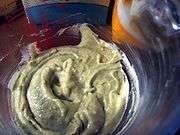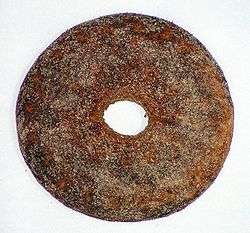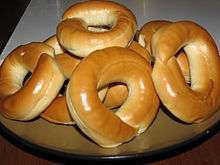Finnish bread
In Finland, bread is a very important food, served with almost every meal with many different types produced domestically.
Five types of Finnish rye bread (top to bottom/left to right): limppu, reikäleipä, loaf, reissumies and hapankorppu | |
| Type | Bread |
|---|---|
| Place of origin | Finland |
In the Swedish-speaking region of Åland, there are other varieties of bread, the majority of which owe much to Swedish cuisine.
Rye bread

Rye bread (Ruisleipä or hapanleipä (lit. sour bread) in Finnish) is a dark, sour bread produced in quantity in Finland, where it is the most popular type of bread. Compared with the more internationally popular German style, Finnish rye-breads tend to be less oily or moist in texture. The most common types of Finnish rye breads are not sweet nor do they contain spices like caraway, unlike Swedish rye breads. As well as traditional breads more modern, softer breads exist as well these days.
Limppu
Traditional Eastern Finnish rye bread is called limppu. The closest translation to English would be loaf, but that does not actually describe the round, bulbous bread that is actually known as limppu, and could cause confusion as rectangular loaves are also available and are not called limppu. This bread is dark, sour in taste, dense, heavy and comparatively dryish. Its mouthfeel still remains soft enough to be bitten off easily, and leavening is easily discernible even by eye. This kind of bread was usually produced at steady intervals throughout the year, whereas Western Finnish tradition stressed rare baking sessions combined with long-term storage.
Limppu is common in the Upper Peninsula of Michigan due to high levels of Finnish immigration and may be found in many pubs and diners across the peninsula.
Reikäleipä

Traditional Western Finnish rye bread (reikäleipä lit. hole bread) is dried near the kitchen ceiling and preserved over the long winter into its many forms. Nowadays this kind of bread is available in all its forms and stages of aging throughout all of Finland, regardless of season.
Ruispala
Vaasan Ruispala, (lit. rye piece) a brand of rye bread by Vaasan, is Finland's "most popular bread" according to the company. It is otherwise similar to reikäleipä, but is more consumer-oriented. It comes in single portion size, it mixes condensed rye bread taste with zero-day delivery, it borrows from the German rye bread tradition in keeping a more humid, greasier texture than is traditional in Finland, and it makes the best of the humidity preserving qualities of traditional rye bread by serving each piece of bread as a pre-cut pair of two halves, which protect each other but can still be easily separated.
The brand is not without competitors. Two of them are Fazer's Ruispuikulat (a newer competitor), which are oblong in shape instead, and Oululainen's Reissumies (preceding Vaasa's formulation by about a decade), which are round. Both competitors are distinctly more traditional in formulation than Ruispala, mainly changing the size and shape of the traditional rye bread. As rye bread is the staple one in Finland, the competition among the brands remains fierce to this day.
Jälkiuunileipä
The old tradition was that all bread in the house for the year was baked in a few days, in a large oven that took a long time to cool after being fired. Thus, jälkiuunileipä (lit. "after-oven bread") could still be baked in the residual heat. The longer baking time in the lower temperature gives it a darker color, higher density and hardness than regular rye bread, comparable to a fruit cake. In addition to the traditional reikäleipä shape, there are also rectangular ruispala-type pieces available.
Crispbread
Crispbread (näkkileipä in Finnish) are leavened rye breads that are dried into thin crisp. They are sometimes made using sour dough. Crispbread are very common throughout the Nordic countries and if stored properly will not spoil for a long time. Variants of crisp bread are thicker (½ cm), air-containing crisps (called just näkkileipä) and thinner sour crisps (hapankorppu). The most common type, often stereotypically associated with schools and other institutions, is rectangular in shape, e.g. Koulunäkki and Kunto brands. A round shape is another variant. Hapankorppu is rectangular.
Wheat bread
Because traditionally wheat was not as abundant as rye or barley, wheat is mainly used for baking of pastry, scones, pulla and nowadays is often combined with other types of flour to make things like Karelian pasties and meat pies. There are a few wheat breads in Finland, although most are simple buns or loaves of sliced or unsliced bread.
Vesirinkeli

Vesirinkeli (water ring) are small rings of yeast leavened wheat bread; which resemble bagels. They are available in several different varieties in supermarkets.
Other breads
There are countless varieties of breads throughout Finland and it would be impossible to catalogue them all, however there are some important types which do not fit in other areas, and they are mentioned below.
Oat bread
Oats (kaura) are the most commonly produced grain in Finland so it makes sense that bread based on oats will be very popular, although not as popular as rye breads. The most common use in bread is in rolls or buns (sämpylä) or in flat soft bread pieces similar to ruispalat or reissumies rye breads.
Potato bread
The potato, although a late introduction to Finland, features heavily in the diet and has found its way into many kinds of breads. Usually dough made with potato will be very soft and the bread will be moister and fluffier than plain wheat or oat bread.
Christmas bread
There are several varieties of Christmas breads, however most are made in a similar way to a basic ruislimppu bread however they typically include molasses and other Christmas time flavours like orange, cinnamon, fennel, aniseed and caraway.
Korppu
Korppu (rusk in English) are hard and crisp, resembling small bread rolls but usually halved and much harder. The sweet versions are often sprinkled with cinnamon and sugar. There are also variations of korppu which are totally flat and unleavened, usually made of either rye or oats. The flat ones are called hapankorppu In Finland.
Rieska
Rieska (pronounced ['ries.ka]) is unleavened, usually barley-based, soft flat bread. They are often served warm and buttered and consumed with milk. The most simple rieskas contain only flour, salt, and water, but industrial bakeries usually use yeast as well. Rieskas are baked in the oven but they may be baked on a frying pan (like pancake) or even on a heated stone as well. The most common kinds of rieska are:
- Ohrarieska (barley rieska) - by far the most common and traditional variety.
- Perunarieska (potato rieska) - another common variety. The dough is made of mashed potatoes.
- Ruisrieska (rye rieska) - this kind of rieska is often made without barley flour but rye instead.
- Maitorieska (milk rieska) - this is a local specialty and a traditional food in the Ylivieska area of Finland. It is very similar to the plain ohrarieska, but made with milk rather than sourmilk or buttermilk.
Barley rieska is a local speciality in northern parts of Finland, especially in Lapland and North Ostrobothnia, but some rieskas are manufactured by major bakery companies and therefore commonly available in grocery stores all around the country.
Confectionery
Pulla
Pulla is a cardamom flavoured, yeast-leavened sweetened bread, often served with coffee. The usual recipe is based on milk, sugar, wheat flour, butter, with yeast and a very small amount of salt as additives, and cardamom or saffron as spices. Pulla is similar, but drier than a brioche, as eggs are not added into the dough. In contrast to other nationalities' sweetened breads, these are not buttered. Pulla, when made into a roll with cinnamon and sugar and cut into spirals before baking, becomes korvapuusti (cinnamon roll).
Sokerikorppu
A korppu (rusk, see above) is sweetened with sugar and spiced with cinnamon.
See also
External links
- Traditional Rye, Ruokatieto